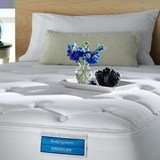Electric Mattress Pads
Are These Heated Mattress Pads Your
Best Option for a Cozy Night's Sleep?
Electric mattress pads are a new alternative to electric blankets for keeping warm at night, especially during the colder months of the year, but they are not right for everyone. Learn more about how they work and whether these heated mattress pads are right for your needs!
The pad works a bit differently than an electric blanket because it goes underneath your body rather than over your body. Some consumers replace their existing mattress pad with the electric one or they simply place the electric pad over their existing one. Either way, it goes underneath the sheets to provide warmth and additional padding.
How Do These Mattress Pads Work?
The concept behind the way an electric pad works is pretty basic. When electricity passes through the wires woven into the middle of the pad, heat is generated and passes through the fabric of the pad into the body.
We know that heat naturally rises, right? An electric pad underneath the body keeps the heat around the body and within the fitted sheet for the most part.
Why Do People Like Electric Mattress Pads?
Consumers report several reasons for choosing an electric pad over an electric blanket. Among the top reasons is that the pad keeps them warmer throughout the night and the dual control feature is wonderful for customizing each side of the bed for personal warmth preferences.
People also seem to like these pads because they can keep the bedroom cooler during the night and turn off the main heat in the house overnight. They save money on their heating costs each month, which means they get a pretty quick return on their investment in the electric mattress pad.
Some people use the electric pad to simply warm up the bed prior to climbing into the bed, whereas others keep the pad switched on for the entire night on a low consistent setting.
Advantages of Electric Mattress Pads
- Alleviates back pain and arthritis pain for some people
- Provides more warmth for the body than an electric blanket
- Save money - turn off the home heat during nighttime hours
- Creates a nice warm bed to climb into
- Retains more heat around the body than an electric blanket
- Individual control settings so you can keep your side as hot or warm as you like
- Keeps you warm without heavy comforters or quilts on top of you
- Automatic shut-off feature after 10 hours of operation
- Reasonably priced at $50 - $150 depending on brand and features
Drawbacks of Electric Mattress Pads
- Some consumers feel the wires beneath the fabric and find them uncomfortable
- Required safety features can be time consuming just to use the pad
- Electric mattress pads can stop working altogether and there's not much that can be done to fix them
- The electric pad can slide and move during the night
- Electric pads are not always made to be a perfect fit for every mattress size, which is the cause of slippage
- Can cause overheating while sleeping
- Electric pads cannot be used with adjustable air beds because wires can get pinched
- Not machine washable
- Must be hung to air dry
- Can cause discomfort for those who are sensitive to electromagnetic fields
Tips for Purchasing an Electric Pad
One of the most critical criteria to consider when shopping for an electric pad for your mattress is the thickness of the pad. Make sure you choose a pad that is thick enough for your desired comfort level.
Don't hesitate to open the package and feel the thickness of the pad and to see if you can feel the wires inside the pad to the point that it might be uncomfortable. Keep in mind that your body weight will be on the pad, which means if the pad is thinner, there may be a greater chance that you will feel the wires in the pad.
Compare prices! Consumers can find these pads available for purchase through online retailers, department stores and mattress outlet stores, and discount retail stores.
Just as with any other product, check the prices across the different retailers to see who offers the best price for comparable product lines.
Read consumer reviews on the different brands of electric pads so you have some information in hand while shopping.
Dual controls aren't available with all brands; so if this is an important feature for you, make sure the one you want to purchase has the dual control feature. It's also wise to get one that has the automatic turn-off feature.
Make sure the electric pad product you're considering has the mark of UL 964 - this means that the Underwriters Laboratories have marked the product as one that complies with their high safety standards.
Who Should Not Use an Electric Pad?
Electric pads are considered safer than electric blankets, but there are some people who should not risk using an electric pad due to possible health risks.
- Pregnant or nursing women
- Anyone who doesn't have complete control of limbs and coordination
- Alzheimer's patients
- Infants, babies, or young children
- Pets
- People who suffer with urinary incontinence - children or elderly
- Never use these on top of a waterbed
How To Clean Your Electric Pad
You can carefully clean an electric pad by using a clean rag soaked in mildly soapy water and dabbing any soiled areas of the pad. Carefully rinse the affected areas under running tap water, making sure that no exposed wires come into contact with the water.
Squeeze out any excess moisture and hang to dry. Allow at least a few hours to dry completely. Weather permitting, you can also hang it outside on a clothesline to dry for a few hours to freshen the pad.
Are There More Natural Alternatives to Electric Mattress Pads?
For those wanting to save on energy costs, or who prefer to avoid the electromagnetic fields that are generated by electric mattress pads, there are some other more natural options to creating a warm, cozy bed!
- Try using a down comforter on your bed to keep you warm. The down comforters aren't as heavy as some quilts, but the down naturally keeps the heat contained in the bed.
- If you are allergic to down, there are hypoallergenic down alternative comforters available that feel just as soft and warm as down, but without the small and the "achoo" factor that you may experience with down. Another plus is that most of the down alternative comforters are less expensive!
- You could try making some bed warmers! Simply sew together two hand towels, fill with white rice or jasmine rice, and sew the last seam together securely.
Heat in the microwave for about three minutes and then place them into your bed underneath the covers before climbing into the covers. You could keep them in bed with you or remove them once you get into the bed. - Take a hot water bottle with you to bed, and hold it near your tummy. This will warm your whole body!
- This last tip is only for those who have no trouble sleeping. Do a few jumping jacks before climbing into bed! You'll get the blood flowing that way for sure and be warmer too!
Let's All Sleep Better
Help us to spread the word!
Simply copy and paste this code into your Facebook page or blog. Thank you for sharing!
Related Articles:



New! Comments
Share your thoughts about what you just read! Leave me a comment in the box below.